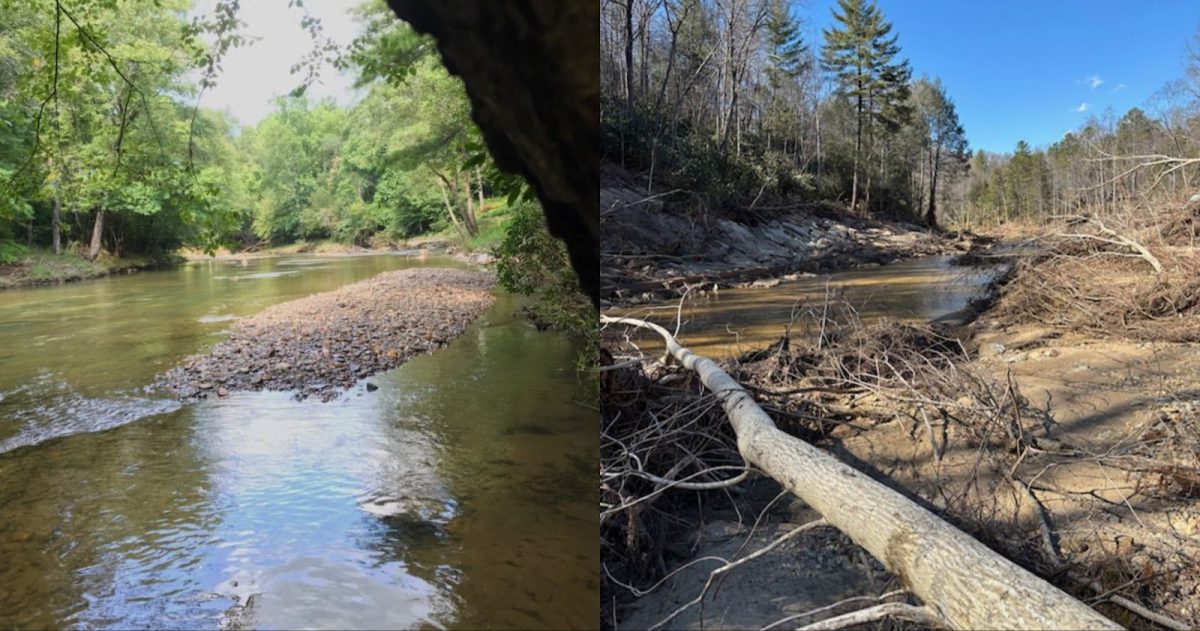Hurricane Helene caused unprecedented damage across much of Western North Carolina, and five months later, many residents are still cleaning up the damage in their backyards.
“We’ve had floods before, but this is several levels of magnitude greater. It was just indescribable,” said Bill Punshon, a UNCA alumnus who has owned property off the Swannanoa River since 1988.
“The high watermark was so far up, I never thought it would go anywhere near there,” Punshon said. “And the river was 100 yards wide at that point. It’s normally about, well it was normally about 50 feet wide and you could wade across it without getting your crotch wet.”
After Helene, much of the landscape changed. The storm brought down many plants and trees, the river bank shifted about 50 feet, and the soil composition completely changed.
“It was just unreal what happened. We had a little picnic table, we were building a shed. All of that just washed away,” Punshon said.
While the storm was raging on, Punshon and his wife, Cathy, a fellow UNCA alum, didn’t realize the damage they would be experiencing. Like many others in Western North Carolina, it felt like a lot of rain.
“We woke up the next morning, walked out and there was a tree on our RV and leaning over our cars,” Punshon said. “We were cutting the tree off our RV and you could just hear the other trees snapping. One tree down there was 2 feet in diameter and it just snapped off.”
While tree and vegetation loss always harms ecosystems, it has an even greater impact on water systems. This loss can damage riparian zones that help prevent flooding, something many in Asheville are concerned about.
“We are here working with them to help stabilize the riverbank so it doesn’t erode any further,” said Renee Fortner, another UNCA alum working as RiverLink’s Director of Programs.
She and her team went to Punshon’s land to evaluate and begin repairing their river, aided by UNCA students in a restoration ecology class. RiverLink is able to do this project through grant funding, known as their Adopt-A-Stream Program.
“The reason that we are doing [riparian restoration] today is to hold the soil in place, filter water, which improves water quality and by holding that soil where it is, it helps with the number one pollutant in this area, which is sediment,” said Madeline Walker, the AmeriCorps Watershed Coordinator at RiverLink.
Walker said protecting water from sediment pollution is essential for aquatic life in the river and its various uses for humans, including trout and swimming.
“This is a natural process, having sediment in the water, but it’s the rate of the sedimentation which makes it a degraded stream at some point,” Walker said.
They didn’t test the stream to see the sedimentation levels, but the discoloration of the water and the erosion on the bank led the team to believe the stream wasn’t doing well. According to Walker, in many streams, this is because they cut down into bedrock during the storm.
“All that loose vegetation and sediment that used to be deposited on the banks, which is the bottom of the stream, is no longer there,” said Walker.
At the Punshon’s property, they planted river cane, a native riparian plant, to help prevent erosion and flooding. They also used temporary seeding to support even the nutrients, prevent erosion and stabilize the damaged soil.
“We’re focusing on specific counties with the French Broad River watershed, so these would be properties in Henderson County, Transylvania County, Buncombe, Madison and Yancey County,” Fortner said. “So if a property owner has a stream that was damaged by Helene and the erosion isn’t too severe, then they’re eligible to be part of the program.”
Fortner said people who live within the listed locations could apply for the Adopt-A-Stream program by visiting the RiverLink website. RiverLink will assess the damages and make a plan.
While Punshon is still hoping for many of the plants he had before the storm to bloom, he said the aid he saw the region receive and the work RiverLink has done has restored his faith in humanity.
“It was incredible,” he said. “Good people aren’t hard to find.”


![Brooke Pedersen [second from the right] and Luis Reyes [right] hold banners during the Wrap The Woods event.](https://thebluebanner.net/wp-content/uploads/2025/09/ELIZABETH_PRITCHITT_IMG_3470-1200x804.jpg)
















